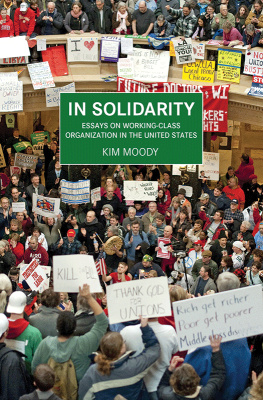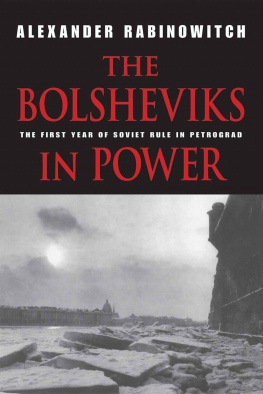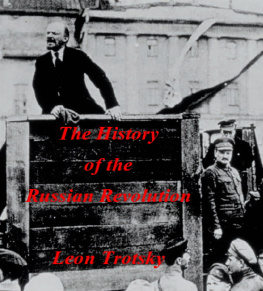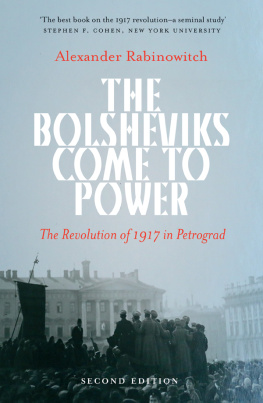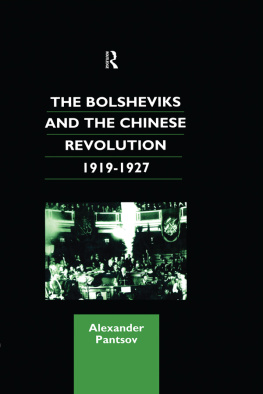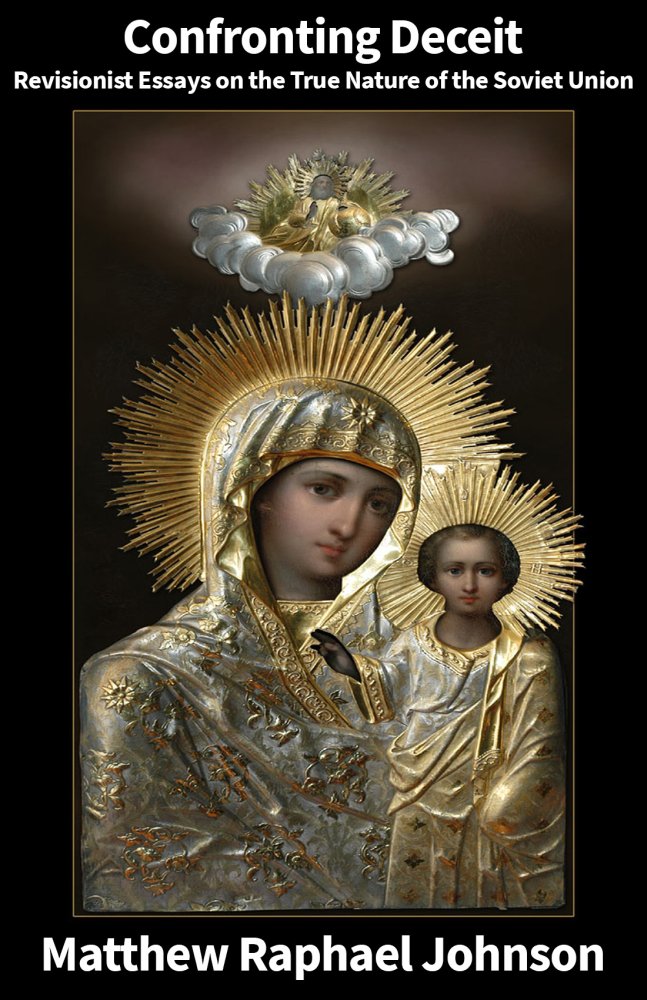
Confronting Deceit:
Revisionist Essays on the True Nature of the Soviet Union
Matthew Raphael Johnson
Hromada Books
2017
Visit www.rusjournal.org
Introduction
Some years ago while doing research for a long paper on the Burmese military government, I came to a surprising realization: in obscure areas, nations almost entirely unknown even to educated Americans, there are no incentives for journalists to scrupulously tell the truth. Since there is no one to correct them, they have no real inducement to write strictly in the realm of fact. Then, after that, another lightening bolt struck me: in obscure regions of the world, it is much easier for even well-intentioned writers to err, since they are more apt to just impose familiar patterns on the unfamiliar. I termed this, modestly enough, Johnson's Law and it has the two formulations above.
This book is a set of essays on various facets of the Soviet Union. The overarching arguments made are several:
Firstly, The Bolsheviks never cared about labor in the sense that labor refers to the working people of the empire. The Bolsheviks defined labor so broadly that it became meaningless. They did not believe it themselves. The Bolsheviks held labor, defined above, in utter contempt.
Second, The purpose of the revolution was to use ideology to cover over a radical idea: that the Red state, backed by extreme violence and terror, papered over by slogans, was nothing more than a transmission belt delivering all productive capital into the hands of the new ruling clique. Despite their name, the Bolsheviks were a tiny, urban group of intellectuals who had no ties with the people they were soon to rape and cared little for this fact.
Third, the methods by which this belt was to operate were not controversial. Trotsky, Lenin and Stalin were of one mind on all things, until the Jewish question, personified by Trotsky, became explicit. This by no means requires a belief in Stalin's antisemitism. I t remained a capital crime in the USSR under his rule. The Old Bolsheviks, almost exclusively Jewish, were the target, not Jews as such, who were a privileged group in the new Russia.
Fourth, nationalism of all sorts was banned throughout Soviet history. Western accusations of this new-Soviet crime are absurd exaggerations. Several examples of what western academics think nationalism is will be shown below.
Fifth, given the above, the USA was never anti-Bolshevik (even to the extent that the western ruling class had any idea what Bolshevism was). Almost every early condemnation of the Reds was based on them acting like Tsars. This was the main line of criticism. It was a rare find to discover an American that had any idea what Leninism was to any great extent.
Finally, the USA built the Soviet Union, along with the major western powers, even during their own Depression.
The final two essays are on Russian and Ukrainian resistance literature. The first, from Solzhenitsyn and the second, his Ukrainian counterpart, Vasyl Stus. They round out this collection by providing an up close understanding of the Soviet system, as both men served many years in the camps.
Historians have one purpose: to destroy the vague, fuzzy and imprecise semi-knowledge of the common educated person. It needs to be replaced with the truth independent of the self interest of the writer. The ignorance of the pretentious of the academic, pseudo-intellectual should be swept away with utter contempt. The level of pretension in the west is shockingly high. At no time in history has so much data been available to the common man. It is overwhelming even in the most limited, specialized fields. Yet, the level of rational discourse, factual understanding and wisdom has not only stagnated, but has gone backwards.
Back to the thesis: When a country has a totally planned economy, the obvious implication is that country's ruling class owns and controls all productive capital. If they can plan it, they thus own it. They can do as they please with it. This conception has never, not once, penetrated the mind of American intellectuals on the USSR. Central planning means that everything all property is under the direct control of the ruling class. It is both their personal and institutional property. This fact seems to have no impact on American histories of the Evil Empire. The Soviet Ruling class was by far, the wealthiest ruling class in the world and they held the daily lives of every single person in the empire in the palm of their hands. Worse, western intellectuals and media covered for them.
How do we know this cosmopolitan, urban, elite Red movement cared nothing for labor? When the Reds took power, they destroyed all successful socialist forms of economic production in Russia. One would think that, if labor was their primary concern, these would both be preserved and promoted. This too has never been mentioned by Russia scholars pulling down six figures in American universities. The Labor Brotherhood of the Holy Cross, the peasant commune, the Old Believer villages, the Cossack Krug, the urban Artel and the monasteries are all wondrous examples of successful socialist, communitarian economic life. Not only were they destroyed, they were also called examples of capitalism and reaction. Does this strike anyone else as odd?
The church is, by its constitution, a socialist institution rejecting the private ownership of capital. The patristic witness to this is overpowering. Why, then, was the church seen as an enemy to socialist reconstruction? Even after the 1918 sobor where the monarchy was rejected by the modernist bishops in Russia, they still all went to prison in huge numbers. Why waste such tremendous resources to do this? All the Reds had to do is claim that they were bringing the Gospel to fruition or rhetoric of a similar kind and they would have had a large, popular social institution as an ally. Yet another question no one has thought to bring up in almost a century of scholarship.
The point of this is to show that all common claims about the USSR are false. The Party cared nothing for socialist reconstruction since such communities already existed in parts of the Russian empire. There must be an external, non-ideological reason for the pathological, obsessive torture and murder of thousands of Orthodox clergy, none of whom were members of the upper classes and were often almost always highly sympathetic to labor. The primary reason was that the Reds were overwhelmingly Jewish and hated the church (as well as gentiles in general) from a cultural and mythical aspect of their being.
It is a myth that Marx thought Russia an unsuitable place for socialist experimentation. His letter to Vera Zasulich states quite the opposite: Russia had a strong socialist tradition. I've already mentioned this. Yet, even Karl himself had no interest in labor. When Proudhon's followers demanded that actual workers be represented in the First International, Marx's neurotic temper tantrum response led to their expulsion from the movement. He was outraged. Eyewitnesses, Bakunin among them, described Marx as red-faced with rage. Then, the anarchist leader said something startling about this event:
Himself a Jew, Marx has around him, in London and France, but especially in Germany, a multitude of more or less clever, intriguing, mobile, speculating Jews, such as Jews are everywhere: commercial or banking agents, writers, politicians, correspondents for newspapers of all shades, with one foot in the bank, the other in the socialist movement, and with their behinds sitting on the German daily press they have taken possession of all the newspapers and you can imagine what kind of sickening literature they produce. Now, this entire Jewish world, which forms a single profiteering sect, a people of blooksuckers, a single gluttonous parasite, closely and intimately united not only across national borders but across all differences of political opinion this Jewish world today stands for the most part at the disposal of Marx and at the same time at the disposal of Rothschild. I am certain that Rothschild for his part greatly values the merits of Marx, and that Marx for his part feels instinctive attraction and great respect for Rothschild.
Next page

